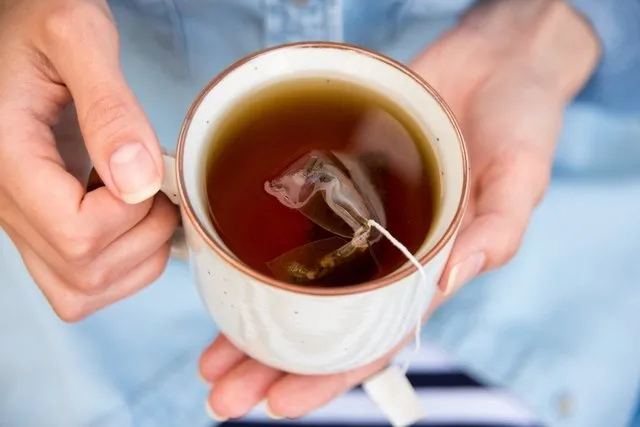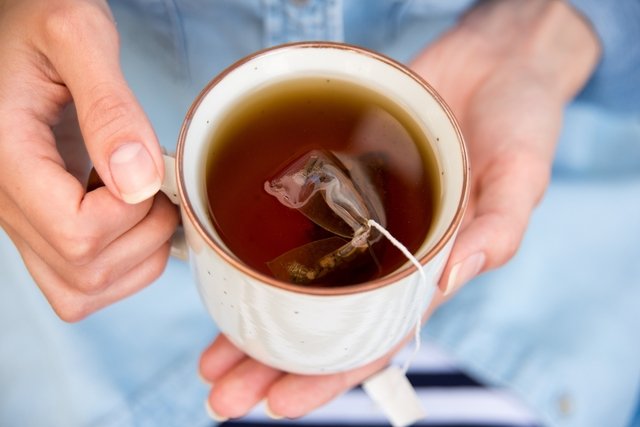Drinking teas for better sleep, such as chamomile, valerian or lemon balm, are a natural and simple option to help in the treatment of insomnia, especially in cases where difficulty sleeping happens due to excessive stress or recurring consumption of stimulants, such as alcohol, caffeine or nicotine, for example.
Most sleeping teas work in the central nervous system, so it is important that they are consumed 30 to 60 minutes before bedtime to allow them to have time to relax their body and mind. However, it is important that along with the consumption of the teas a healthy sleep routine is also done, to enhance the relaxing effect. Check out 8 steps to create a healthy routine before bed.
Sleeping teas can be used individually or in a mixture of 2 or 3 plants. One of the most used mixtures is valerian with passiflora, for example. The ideal is to increase 250 mL of water for each plant added to the tea.

15 teas to sleep
Some teas for better sleep are:
1. Tea of passiflora
Passiflora is the flower of the passion fruit plant and, according to several studies, has excellent relaxing action of the nervous system, helping to treat stress and anxiety, but can also be a great ally for the treatment of insomnia.
Ingredients
- 1 tablespoon (soup) of dried leaves of passiflora or 2 tablespoons of fresh leaves;
- 250 mL of boiling water.
How to prepare
Add the passiflora leaves in a cup with boiling water and let stand for 5 to 10 minutes. Then, curb, let love and drink 30 to 60 minutes before bedtime.
Passiflora tea should not be ingested in pregnancy, nor by children under 12 years. In addition, its consumption may interfere with the effect of some drugs, such as aspirin or warfarin, and it is important to consult a doctor if you are using some type of medication.
2. Chamomile tea
Chamomile tea is popularly used to soothe, being indicated in stressful situations, but also of insomnia. According to some scientific studies, this plant seems, in fact, to be quite effective for inducing sleep, since it demonstrates to have sedative properties. Although the exact mechanism of action is not known, it is believed to act on benzodiazepine receptors, which decrease the action of the nervous system.
In addition, the steam released by chamomile tea, when inhaled, has also been shown to be able to reduce stress levels.
Ingredients
- 1 handful of fresh chamomile flowers;
- 250 mL of boiling water.
How to prepare
Pass the flowers by water and dry using a sheet of paper towel. Then place the flowers in the boiling water and let stand between 5 and 10 minutes. Finally, to curb, let love and drink.
After harvesting, chamomile flowers can be stored in the refrigerator for up to 2 days, and it is only recommended to place them inside a closed container.
Intake of chamomile tea should be avoided in pregnant women and children, especially without guidance from a doctor.
3. The Tea of Valerian
Valerian tea, made with the medicinal plant Valeriana officinalis, is another of the most studied options to help treat insomnia and help sleep better. According to various investigations, valerian releases substances increases the amount of GABA, which is a neurotransmitter responsible for inhibiting the nervous system, helping to relax.
According to some studies, when used in the treatment of insomnia, valerian seems to increase sleep time, as well as decrease the number of times one wakes up during the night.
Ingredients
- 1 tablespoon (soup) of dry valerian root;
- 250 mL of boiling water.
How to prepare
Place valerian root in boiling water and let stand between 10 and 15 minutes. Then, put it, let it love and drink 30 minutes to 2 hours before bedtime.
Valerian tea should be used with caution in pregnant women and people with liver problems.
4. Lemon balm tea
Like chamomile, lemon balm (Melissa officinalis) is another plant that is very traditionally indicated to treat excess stress and insomnia. According to some research, the plant seems to avoid the degradation of GABA in the brain, which potentiizes the effect of this neurotransmitter that has as main function to relax the nervous system.
Ingredients
- 1 tablespoon dried leaves of lemon balm;
- 250 mL of boiling water.
How to prepare
Add the leaves in a cup with boiling water and leave to stand for 5 to 10 minutes. Then curb, let mull and drink 30 minutes before bedtime.
The tea of lemon balm should be avoided during pregnancy and lactation.
5. Tea of herb-of-are-joon
The St. John’s wort (Hypericum perforatum), also known as hypericao, is a plant widely used to treat depressive states, but which can also be used for anxiety and insomnia.
This is because the herb of them are the airy, has substances such as hypericin and hyperforine, which act at the level of the central nervous system, calming the mind and relaxing the body.
Ingredients
- 1 spoon of St. John’s fends.
- 1 cup (250 mL) of boiling water.
How to prepare
Put the St. John’s weed to rest in the cup of boiling water for 5 minutes. Finally, curb, let go of milk and drink before bed.
St. John’s wort should not be used by pregnant women, breast-feeding women or using oral contraceptives, as it may change the effectiveness of the tablet. Children under 12 years old should also only consume the air-to-house herb with guidance from a doctor.
This tea should not be used by people who use antidepressant drugs such as sertraline, paroxetine or nefazodone, for example.
6.Lettuce tea
Although it may seem strange, lettuce tea has been shown to have a strong sedative and relaxing effect for babies. Thus, this tea is considered a safe option to use in children older than 6 months. This tea can also be used in pregnancy.
Ingredients
- 3 chopped lettuce leaves;
- 1 cup of water.
How to prepare
Boil the water along with the lettuce leaves for 3 minutes. Then, to curl, let it cool and drink at night.
Read also:
youraude.com
7.Lavender tea
Lavender is a medicinal plant of the species Lavandula angustifolia with proven sedative, relaxing, tranquilizer and anxiolytic properties, which help improve anxiety, restlessness and agitation, reduce stress and fight depression, which can cause insomnia or difficulty sleeping.
Thus, lavender, which is also known as lavender, helps to improve sleep quality, combat insomnia and improve overall well-being. Ingredients 30 g of chopped lavender flowers; 1 litre of water.
How to prepare Place the water to a boil and then add the flowers of the lavender and put the fire out. Cover the pot and let cool down. Strain and drink.
Lavender tea should not be consumed by pregnant women and children, as well as people who have a gastric ulcer. Lavender can also be used in the form of essential oil in aromatherapy, adding 3 to 4 drops in an electric flavoring machine or by placing on the pillow or bedding, to relax and improve sleep. Learn how to make aromatherapy with essential oil.
8. Tea of limia The linden tea, prepared with the medicinal plant Tilia cordata, has calming, sedative and relaxing properties, as it facilitates the action of GABA, a neurotransmitter that decreases the action of the central nervous system, which helps calm the nerves and relieve anxiety crises, being a good tea option to combat insomnia caused by anxiety.
Ingredients
1.5 grams of dried linden flowers and leaves;
150 mL of boiling water. How to prepare Add the dried flowers and leaves of linden in boiling water, capping and let stand between 5 to 10 minutes.
Then grieve, let love and drink 2 to 4 times a day. In the case of children between 4 and 12 years old it is recommended to decrease the amount of linden to 1 gram per 150 mL of boiling water.
Lime tea should not be used by children under the age of 4, pregnant or breastfeeding women, or by people with heart problems
9. Tea of Kava-kava Kava-kava tea, made with the medicinal plant Piper methysticum, has in its composition kavalactones, natural substances that regulate the action of the neurotransmitter GABA in the brain, having a similar action to benzodiazepines, which are one of the main types of remedies used in the medical treatment of anxiety.
In this way, Kava-kava tea helps reduce anxiety and tension, and improve relaxation, helping to sleep better and fight insomnia. Ingredients 2 tablespoons (of soup) kava-kava root; 300 mL of water. How to prepare Place the root of Kava-kava to boil with water for 10 to 15 minutes. Then let love and grieve.
Drink 2 to 3 times a day. Kava-kava tea should not be used by pregnant and lactating women as there are no studies on their safety. In addition, it should be avoided by people with liver diseases or who are on treatment with antidepressant remedies.
10. Tea of mulungu The tea of mulungu (Erythrina mulungu) has flavonoids and alkaloids in its composition with calming, tranquilizing and analgesic action, which help reduce agitation, nervousness and anxiety, being a good choice of home remedy to combat insomnia.
Ingredients
4 to 6 g of mulungu shell; 1 cup of boiling water. How to prepare Place the mulungu bark in the water and boil for 15 minutes. Then, curb, let love and drink the tea still warm, 2 to 3 times a day.
Avoid taking more than three days in a row. mulungu tea should not be used by children under 5 years of age, pregnant, lactating or by people who use antihypertensive or antidepressant remedies.
11. Tea of lucia-lima The lucia-lime tea, made with the medicinal plant Aloysia citrodora, is an excellent sedative, and therefore is an ideal tea for which it suffers from insomnia.
Ingredients
1 tablespoon of dried leaves of lucia-lia; 1 cup of water How to prepare Boil the water and add it in the cup with the dried leaves of lucia-lila. Leave in infused for about 10 minutes.
Then, curb and drink 1 cup of tea 2 to 3 times a day. See other ways to use lucia lila. Limea water tub should not be used by pregnant or breastfeeding women, or by people who have kidney problems.
12. turmeric tea Turmeric tea (Curcuma longa) is rich in curcummineids that improve sleep by acting on histamine H1 receptors, in addition to having an anxiolytic action through its effect on some neurotransmitters. Look at other benefits of turmeric.
Ingredients 1 teaspoon of turmeric powder; 150 mL of boiling water How to prepare Add the turmeric powder in the cup with boiling water and let it sit for about 10 to 15 minutes.
Then, expect to mull and drink up to 3 cups a day of this tea for up to 7 days. Turmeric tea should not be used by people who are taking anticoagulant remedies or who have obstruction of the bile ducts per gallbladder stone.
In addition, this tea should only be used with medical indication in case of suspected or confirmed pregnancy or during breastfeeding.
13. Tea of bay leaf Lauuro leaves (Laurus nobilis) contain substances such as linalool and cinelaol, which release essential oils that help relax the central nervous system, reduce stress and anxiety, and help improve sleep. Ingredients 1 dry bay leaf; 1 cup of boiling wate How to prepare Place the bay leaf in the cup with boiling water and let it sit for about 10 minutes. Then remove the laurel leaf, expect to mullate and drink immediately.
This tea can be drunk 3 or 4 times a day. Barth leaf tea should not be used by children, women in breastfeeding or during pregnancy, as it can cause miscarriage. In addition, this tea should be used with caution by people with diabetes, as it can reduce blood sugar levels and, if taken in conjunction with oral antidiabetics, can cause hypoglycemia, and it is important to always consult the endocrinologist responsible for the treatment.
14. Rue tea Ruding tea, made with the medicinal plant Ruta graveolens, is a natural mild sedative that helps you relax, is good for anxiety, stress and even helps you sleep better. Learn more about other benefits of rue. Ingredients 1 teaspoon (2 to 3 grams) of dried rue leaves; 1 litre of water. How to prepare Place the water in a pan, boil, remove from the fire and add the dry leaves of rue.
Then cover and let stand for 5 minutes. Coar, expect to love and drink 1 cup of this tea a day. Because it is abortive, rue tea is contraindicated for pregnant women. In addition, this tea should not be consumed by women who are breastfeeding, people with kidney diseases or children.
People who use medications to control high blood pressure, digoxin or dobutamine should only use the rue with guidance from a doctor, as this plant can change the effect of these drugs.
15. Tea of peppermint Peppermint tea (Mentha piperita) is rich in menthol with relaxing and sedative properties that help relieve mental stress, anxiety, and improve sleep quality as it interacts with receptors in the brain involved in decreased nervous system activity.
Ingredients
1 tablespoon of mint leaves; 150 mL of water. How to prepare Place the water to a boil and then remove from the fire and add it in a cup containing the peppermint leaves. Tack and let stand for 5 to 10 minutes. Coar, expect to love and drink next.

Sign up for our newsletter and stay up to date with exclusive news
that can transform your routine!
Warning: Undefined array key "title" in /home/storelat/public_html/wp-content/plugins/link-whisper-premium/templates/frontend/related-posts.php on line 12
Warning: Undefined array key "title_tag" in /home/storelat/public_html/wp-content/plugins/link-whisper-premium/templates/frontend/related-posts.php on line 13




